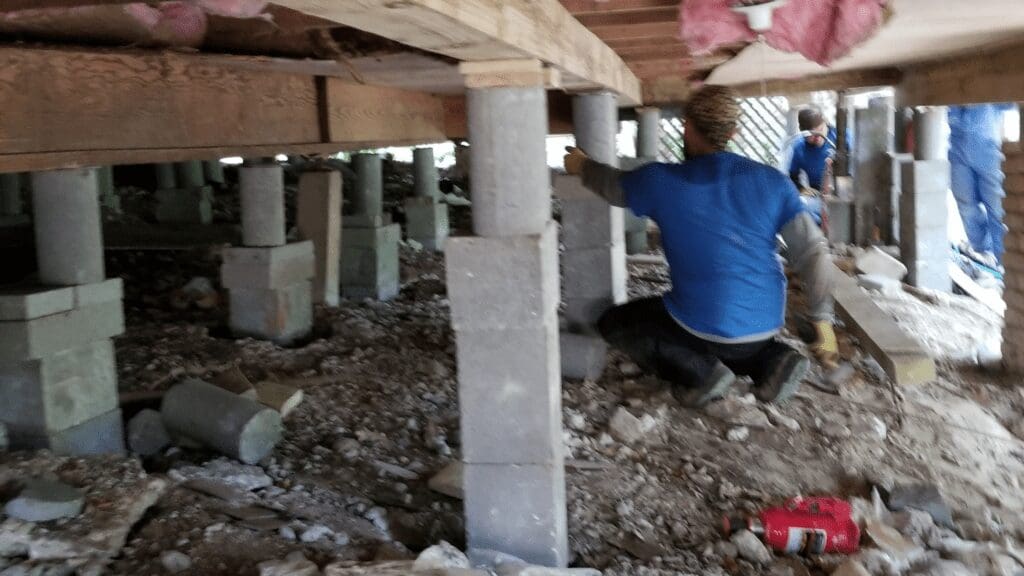Typically, foundation problems lead to major structural damage and costly repairs over time. Even though minor foundation issues, such as hairline cracks and/or damp patches on the walls, floors, and/or ceilings, rarely indicate an immediate risk, they can get worse over time, potentially affecting the structural stability and safety of your Houston home.
In this article, we’ll look at the direct and indirect effects of foundation problems, which also indicate a few reasons why you shouldn’t put off foundation repair.
Assessing the Domino Effect of Foundation Problems
The main reason why you shouldn’t wait to fix your damaged foundation is that specific issues can take their toll on differentstructural components, including piers, beams, joists, wall studs, load-bearing walls, roof trusses, and steel reinforcements. Because these components are essential to ensuring the structural integrity of your home, any foundation problem that affects them could have a negative impact on the entire structure.
As an example, a foundation that settles in an uneven fashion could put excessive stress and strain on certain structural elements, such as concrete piers and wood beams. When varioustensile, compressive, and/or bending forces act on one or more structural components simultaneously, the components could move and shift. In that case, it’s almost impossible to predict the full extent of the damage, especially if the root cause of the problem is allowed to progress indefinitely. But what’s more important is that putting off foundation repair could have some serious consequences, such as:
- Higher repair costs – Usually, foundation problems start off small and become more severe with time. For instance, most large cracks start off as hairline cracks, which spread and deepen gradually. Furthermore, a small crack or other foundation issues that’s left untreated could lead to additional damage over time, including floor, wall, ceiling, roof, and plumbing problems. As extensive damage is more time-consuming and costlier to fix, the only way to save time and money on repairs, while also ensuring that your home’s structural integrity remains intact, is to act fast andschedule a free foundation inspection as soon as you notice a problem with your foundation. Conversely, postponing foundation repairs could lead not only to shockingly high repair bills, but also to irreparable damage.
- Water leaks, mold growth, dry rot, and pest infestations – When a foundation moves and shifts, it usually leads to structural displacement throughout the entire home. All this movement could cause the pipes that run through the floors and walls to move as well. Because pipes aren’t very flexible, they can break. Besides being difficult to fix, leaky pipes inside the walls or under the slab can go undetected for months or even years. During all this time, water will continue to accumulate in different areas of your home, potentially leading to mold growth, dry rot, and pest infestations.
- Higher utility bills – A damaged foundation could cause cracks, crevices, gaps, and sudden separations to appear between different components of your home. Because outside air will enter through all these openings, your HVAC system may have to work harder in order to keep indoor temperatures comfortable in the Houston heat. This could result in higher utility bills.
- Missed opportunities for relatively easy fixes – Most foundation issues are caused by excess water that accumulates around and under your home due to poor drainage.Drainage problems are often a result of negative grading and/or improperly sized or installed gutter systems. In general, both these issues are quite easy to fix. But if poor drainage is identified as being the root cause of a foundation problem after extensive structural damage has occurred, a foundation repair expert might need to take a series of remedial measures in order to fix the drainage problem as well as structural damage.
- Lower property value – Even though there are plenty of buyers who may consider purchasing a Houston home with foundation problems, a damaged foundation coulddecrease the value of your property by 10% to 15%. If you don’t think that’s a lot, 10% to 15% would translate into a loss between $35,000 and $52,500 for a home valued at $350,000.
- Potential loan approval issues – When it comes to loan approvals, most lenders won’t settle for anything else than a house with a solid foundation. This means that, even if a buyer is willing to buy a home with foundation problems, getting financing may be difficult. As well, if a homeowner intends to use a home with foundation issues as collateral for a home equity loan, HELOC, or refinance loan, specific foundation problems may prevent him or her from getting approved for the loan or qualifying for a higher loan amount.
Owning a Houston home comes with a number of responsibilities, including routine maintenance and repairs. Becauseidentifying foundation problems can be difficult sometimes, our professionals are ready to perform a thorough foundation inspection at no cost to you. If foundation problems are found, they’ll also offer you a free estimate and recommend the right remedial measures based on the type and extent of the damage. To get in touch with our experts today, fill out ouronline form or call 713-497-1772.

